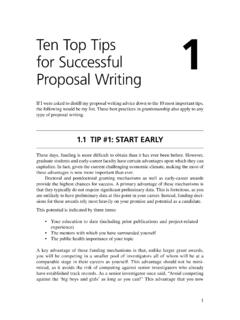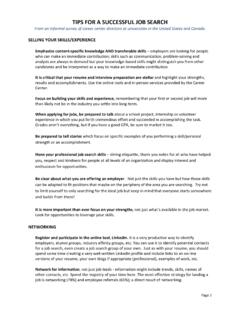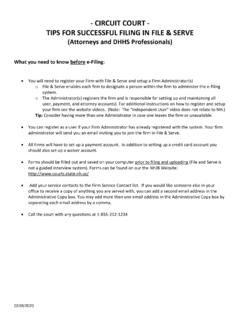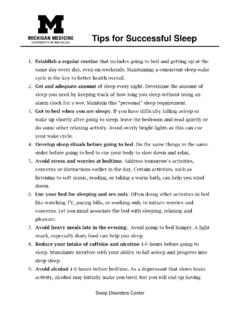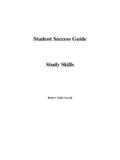Transcription of Tips For A Successful Arbitration - BZBM
1 RREEPPRRIINNTT DDMM__UUSS\\ tips For A Successful Arbitration As courts rely more heavily on ADR processes to resolve cases, and business lawyers steer their clients away from jury trials, business trial lawyers increasingly find themselves in various Arbitration forums. While presenting a case in a hot, interior conference room may not measure up to the courtroom scenes we imagined in law school, Arbitration can offer the trial lawyer some of the best opportunities to hone direct and cross-examination skills. In fact, with the limited amount of discovery often incumbent in the arbitral process, your instincts and skills as a trial lawyer let alone your stamina are often put to the test and heightened by a hard-fought Arbitration .
2 This article presents several suggestions to effectively and successfully present an Arbitration . Some of these techniques differ from those you would use before a jury. Try to Be the Claimant The party that presents its case first has a distinct advantage. It can present its side in a neat, understandable package, before the opponent has a chance to rebut and present its case. Jurors are reputed to feel most deeply and retain most vigorously information they hear and believe first. Cal. Trial Handbook (3d ed. 2004 Supplement) at 69. There is no reason to believe that arbitrators react differently. You should take every opportunity to capture the position of Claimant. Think twice before you advise a client to ignore an Arbitration clause on the chance that a jury will enter a large compensative or punitive award.
3 In reality, trials in business cases are rare and big verdicts rarer still. More likely, the defendant in your case will immediately file an Arbitration demand and successfully compel Arbitration , putting you in the Respondent position and on the defensive. And then you will have to explain to the arbitrator why you sought to avoid Arbitration in the first place. Alternatively, if you represent the defendant and you know a lawsuit is coming, consider a preemptive strike and serve an Arbitration Demand seeking declaratory relief. In this way, you capture the Claimant position and can present your case before your opponent. Set Forth Your Best Facts and Documents in the Demand Conventional wisdom holds that a Demand For Arbitration and other Arbitration pleadings should be brief statement of the claims.
4 I tend to disagree. The first thing the arbitrator will read is the Demand For Arbitration and then the Answering Statement and Counterclaims. The initial pleading provides your first opportunity to persuade. Use it. Consider making your Demand or Counterclaim a complete (but still relatively concise) opening statement with the key facts and documents (and perhaps even law) carefully marshaled leading to the conclusion that your client must inevitably prevail. But try to limit yourself to only those key facts for which you possess strong documentary proof even RREEPPRRIINNTT DDMM__UUSS\\ where your client swears he can clearly prove something later. You don t want to be in the position of having to retract an important fact on the first day of the hearing.
5 Also, be ready for the first status conference with the arbitrator, when she will turn to you and say Counsel, tell me about your case. Give her the 10-minute version of your opening statement illustrated by your five key documents. Take each opportunity to persuade. Jettison Weaker Arguments By the time a court case reaches the jury, you likely have eliminated those alternative positions that you threw into the Complaint or Answer, just in case. An Arbitration requires this same honing of theories, but much earlier in the process. Since the arbitrator will first judge your case based on the Demand or Counterclaim, try to eliminate the weaker or even fall-back arguments from your first pleading. You may not relish explaining at the Pre-Hearing Conference how two of your five claims have now been dropped.
6 And unlike a jury, which frequently will be unaware of tactical moves during a trial, the arbitrator will know all about your shifts in strategy. Substantial changes in position may cause the arbitrator to question your remaining claims. If you start and remain in the position of strength and equity, your chances of prevailing are enhanced. Limit Discovery and Hearing Testimony While our business lawyer counterparts advise their clients that Arbitration is cheaper and faster, we trial lawyers know it ain t necessarily so. It can take a very long time before the hearing commences, especially where depositions are allowed or where three arbitrators and two law firms need to agree on scheduling a month long hearing. With no limits upon the evidence presented, the hearing may also take longer than necessary.
7 At the pre-hearing conference, propose a schedule with realistic limits upon document discovery, depositions, and expert discovery. Equally important, suggest that time limits be imposed on the testimony by each side at the hearing, including direct and cross. If your client is allocated a maximum of 30 hours of testimony, it is amazing how efficient your direct and cross-examinations will become. In an Arbitration we recently conducted, the parties opted to strictly follow the limited AAA discovery rules. We only exchanged documents, took no depositions, and then exchanged expert reports. The upshot was that a lot of new facts came out at the hearing, documents were constantly re-examined for alternative explanations, and theories evolved as the testimony proceeded.
8 If full depositions had been taken, most of these new slants on the facts and documents would have been previously vetted. But at least in our Arbitration , it ultimately did not seem that much would have been gained (other than increasing lawyers fees) by deposing the 15 testifying witnesses. The same basic facts, documents and contentions came through at trial. The practice point is that a case that depends mostly on documents with the testimony providing the color around the edges (like most business cases) may not require many (or any) depositions prior to the hearing. In fact, the lack of depositions presents real opportunities for effective and surprising cross-examination based on the documents. A skilled trial lawyer will likely come out even or perhaps a bit ahead by effectively using the documents against a witness who hasn t been prepared for cross-examination by a previous deposition.
9 Be Candid Candid and forthright advocacy is perhaps more important in an Arbitration than in a court trial. A competent, hard-working arbitrator who has been responsible for a dispute since its inception is unlikely to be swayed by irrelevant facts and overly-emotional appeals. An arbitrator will strive to be dispassionate to decide the case based on the facts. The arbitrator will look to the attorneys to accurately and fully present the evidence. The arbitrator will recognize when zealous advocacy becomes stalling, obfuscation or deception. Once any of these labels are pinned on you and/or your client, your chances of prevailing will be substantially diminished. While there may be a place for dramatics in jury trials, avoid it in arbitrations.
10 Normally, your arbitrator has seen courtroom dramatics many times, and is not about to let it influence her opinion. Most slam-dunk or dog cases settle. To win the Arbitration of the closer cases, don t run away from bad facts or create issues where they do not exist. You only have to win the case, not every argument, document or examination. Present the case accurately, fully and logically. When your opponent strays from this advice, chances are that your client s position will appear stronger. Pitch Your Case to the Arbitrators This is an obvious, but critical suggestion. In a single arbitrator case, there is only one person you need to convince. Focus and present your case so that it will RREEPPRRIINNTT DDMM__UUSS\\ appeal to your arbitrator.

